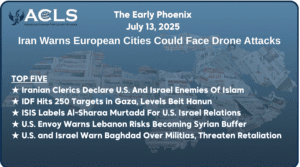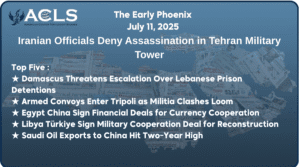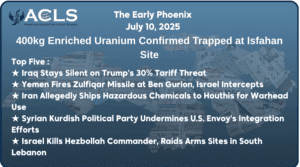13-2-2024
- Hezbollah Strikes Israeli Targets, Israel Confirms Strike on Police Station. Hezbollah confirmed the deaths of five members in southern Lebanon and claimed responsibility for seven operations targeting Israeli sites. They claimed to have struck an Israeli soldiers’ gathering in Birkat Risha with Burkan missiles, and targeted Zarit and Baranit barracks with Falaq 1 missiles. Conversely, Israeli news outlet 24 reported a separate incident where Hezbollah targeted an Israeli police building in Kiryat Shmona. Israeli fighters retaliated with raids on Khiam, Taloussa, Blida, Maroun al-Ras, and Jabal Balat. The Israeli army announced that one of its drones crashed in Lebanese territory “due to a technical defect.” In other related news, Ynet reported that Hezbollah rejected the French Border Agreement. France submitted a proposal to Beirut, aiming to halt hostilities with Israel and resolve the disputed border, calling for a withdrawal of Hezbollah fighters from the border area and Lebanese army deployment. Tensions persist as Western envoys pursue diplomatic options to quell the conflict, with both sides seeking to avoid full-scale war amidst escalating violence. Hezbollah’s Hassan Fadlallah stated that no deal on the Lebanon-Israel border can be reached until the Gaza fighting ceases, asserting Israel lacks the authority to impose terms.
- Hariri Holds Talks with New US Ambassador in Beirut. Former Prime Minister Saad Hariri convened at the Center House in Beirut, engaging in discussions with the new American Ambassador Lisa Johnson. Ambassador Johnson characterized the meeting as “excellent” upon departure. Hariri, who re-entered Beirut to mark the 19th anniversary of his father Rafik Hariri’s martyrdom, previously withdrew from politics amidst nationwide protests in 2019. Despite being designated to form a technocratic government in 2020, Hariri faced challenges in garnering consensus and eventually stepped down. Reports indicate further meetings planned with Parliament Speaker Nabih Berri and discussions potentially involving ex-PSP chief Walid Jumblat.
14-2-2024
- Lebanese Phalange Party Slams Iranian Minister’s Visit.The Lebanese Phalange Party criticizes Iranian Foreign Minister Hossein Amir Abdollahian’s Beirut visit, calling his comments on Lebanon’s security a sovereignty breach. They accuse Lebanese leaders of neglecting public interests, alleging ties to harmful external agendas. The party also condemns the lack of justice in Rafik Hariri’s assassination, blaming Lebanese authorities for inaction against the perpetrators.
- Lebanese Rally for Saad Hariri’s Return to Politics on Rafik Hariri’s Memorial.In Beirut, thousands commemorated the assassination of Rafik Hariri, urging his son, Saad Hariri, to re-enter the political fray. Saad, having just returned from the UAE, reiterated his support for the Lebanese despite previously stepping back from politics and skipping the 2022 parliamentary elections. The crowd, brandishing Future Movement flags, voiced a strong desire for Hariri’s leadership to restore Lebanon’s security and stability amidst ongoing political deadlock and severe economic turmoil. Participants highlighted Hariri’s critical role in consolidating unity and securing international backing for Lebanon.
- Geagea Calls Out Election Disruption by Hezbollah Allies in Meeting with UN Coordinator.Samir Geagea, leader of the Lebanese Forces, voiced strong objections against Hezbollah and its allies for undermining the presidential elections during his discussions with Joanna Wronczka, the UN’s Special Coordinator for Lebanon. Accusing them of double-dealing and sidelining the Lebanese public’s interests, Geagea highlighted the need to respect the diverse political landscape revealed by the 2022 parliamentary elections. He emphasized the importance of representing all Lebanese viewpoints and reiterated the urgency of addressing the Beirut port explosion through an international inquiry to ensure accountability and justice.
- Cyprus Negotiates with Lebanon on Return of Rescued Syrian Migrants.Cyprus is in talks with Lebanon to repatriate 116 Syrian migrants rescued near Cypriot shores, aiming to enforce a previous pact on handling unauthorized immigration. Despite Lebanon’s reluctance, citing its own critical migration issues, the Cypriot government persists, with the Interior Minister highlighting Lebanon’s immigration challenges. Concurrently, Cyprus’s President urges the EU to facilitate the return of Syrian refugees to secure zones within Syria. Meanwhile, Lebanese officials have curtailed attempts by migrants to reach Europe, amid reports by the UN of a significant exodus of Syrian refugees from Lebanon to Europe by sea in 2023.
16-2-2024
- Israel Escalates Strikes on Hezbollah Following Missile Attack. Israeli Defense Minister Yoav Galant declared a ramping up of strikes on Hezbollah in retaliation to a missile assault on Safed, cautioning that Air Force aircraft are now equipped with bombs capable of reaching farther targets. Galant emphasized Israel’s aversion to conflict while asserting preparedness to safeguard northern residents’ return. Concurrently, military maneuvers aligned with raids on Hezbollah positions in Lebanon, prompted by the death of a soldier and injuries sustained in Safed.
- Israeli Strikes Kill 13 Hezbollah and Amal Members.The Amal Movement and Hezbollah reported the deaths of 13 members in clashes with the Israeli army in southern Lebanon today. Israeli artillery targeted five villages in southern Lebanon, including Qantara, Taibe, and Blida. Meanwhile, an Israeli opinion poll reveals 71% of citizens endorse initiating a military operation against Lebanon. Ongoing clashes and raids by Israeli forces in southern Lebanon persist, inflicting significant damage and highlighting the escalating border tensions.
18-2-2024
- Southern Lebanon Under Fire: Israel Responds to Hezbollah Aggression. Israel conducted a series of airstrikes targeting multiple locations across southern Lebanon, including Yaroun, Beit Lif, Ramia, Aytroun, Ghaziyeh, Zahrani, and the outskirts of several other border towns such as Mays al-Jabal and Hula. These attacks were in response to Hezbollah’s activities, including the seizure of an Israeli drone and rocket strikes on Israeli military sites. Recent Israeli airstrikes have resulted in civilian casualties and significant damage, with Hezbollah retaliating by targeting Israeli military barracks and infrastructure.
- Exposing Hezbollah’s Tunnels: A Greater Threat Than Hamas’s Gaza Network.Over the past three decades, Hezbollah has developed an extensive tunnel network across Lebanon, utilizing North Korean technology. This network, detailed in a report by the French newspaper “Liberation,” features hundreds of kilometers of tunnels equipped with advanced surveillance technologies, including motion detectors and optical fibers. These tunnels, more complex and potentially more dangerous than those built by Hamas in Gaza, are intended as a defensive measure against potential Israeli invasions. Israel’s Operation “Northern Shield” in 2018 highlighted the strategic threat posed by these tunnels, with efforts to detect and destroy them to prevent the risk of tremors and landslides from explosions. The United Nations Interim Force in Lebanon (UNIFIL) has noted that these tunnels violate Resolution 1701 by crossing into Israeli territory, amid recent escalations in bombings between Israel and Hezbollah. UNIFIL has called for an immediate ceasefire to prevent further casualties and displacement in the region.
22-2-2024
- France’s Mediation Efforts in Lebanon-Israel Conflict and Support to Lebanese Army Delayed. France recently offered a comprehensive proposal to Lebanon, aiming to resolve the long-standing border dispute with Israel, focusing on the contentious Shebaa Farms and Kfar Shouba Hills. This initiative, facilitated through the French embassy and presented in three languages, signifies France’s proactive stance in fostering dialogue. However, an intended conference to support the Lebanese Army, scheduled for February 27, has been postponed indefinitely due to disagreements with European and U.S. capitals over the ongoing regional conflict and political uncertainties. The premature announcement of the conference, without consulting international partners, led to confusion and highlighted the complexities of specifying the Lebanese Army’s role amidst the volatile situation. The delay reflects the intricacies of aligning international efforts, especially considering the recent deadly exchanges between Israel and Hezbollah, which have intensified the need for a clear political solution and support for Lebanon’s security forces.



